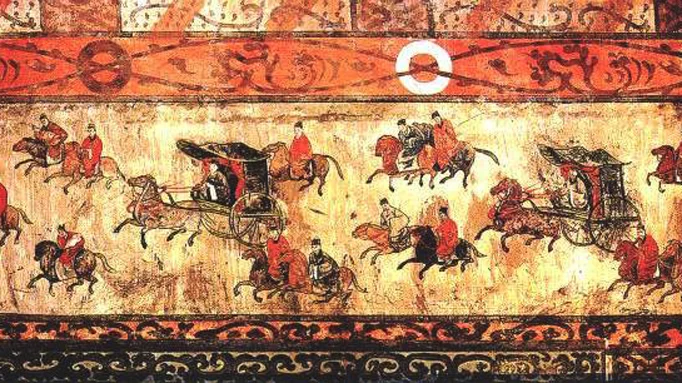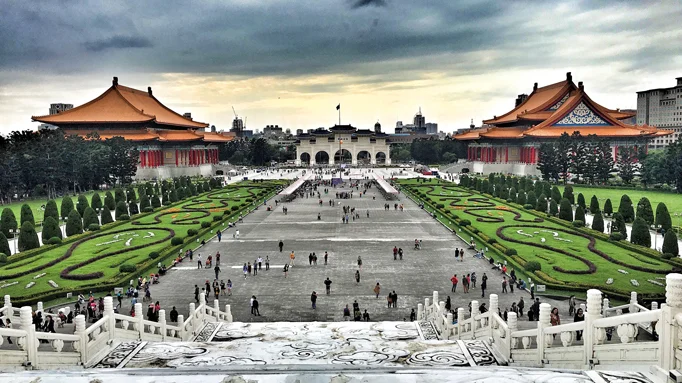Newsletters Trips@Asia
China's Rise to Superpower
China’s paramount leader Xi Jinping said "Over the past 70 years, the Chinese people, with perseverance and strenuous efforts, have achieved rapid development which owes the world. Harsh poverty, which has haunted the Chinese people for thousands of years, will soon become a thing of the past, a great miracle in human history!" on the occasion of the 70th anniversary of the country. But the country’s grandeur history tells a whole different story!
They were fighting furiously! There was no time to sleep! With risks of betrayal and threat even from an ally, The Warring States (475 BC – 221 BC) were always on the lookout and had to constantly conspire with and against one another to rule larger territories. Iron instead of bronze, mass infantry and cavalry instead of sparse chariot fights made warfare more violent. The most innovative way for the Seven States that ruled different parts of the Chinese territory to win popular support was to spread their own social and political philosophies. This is when the famous schools of Confucianism (benevolence and righteousness), Mohism (everyone is equal), Taoism (complying with the natural rhythm) and Legalism (enforcement of laws) emerged to discipline the public.

In contrast, under one-party rule, the People’s Republic of China has a mass surveillance system for monitoring its entire territory to keep the mainland intact and crack down separatist movements. Iron making developed into the world leading steel production that accounts for 50% of the global market. It has the biggest military force in the world with over 2.3 million troops and the second biggest reserve army only after North Korea. Old war chariots are replaced by the most advanced military technologies of stealth drones and aircrafts capable of carrying nuclear missiles and flying without being detected. Traditional cultural aspects and religious beliefs were opposed by series of political movements as the country officially advocates state atheism. In 2014, about 74% of the population reported non-religious or practice folk belief, 16% Buddhist, 2% Christian, 1% Muslims and 7% are other religions and beliefs. Rather than religions, Confucian philosophy has been and still dominates the Chinese mindset to these very days.

They were all under heavenly emperors! There was no time to waste! With the invention of papermaking in 105 AD, Imperial China (221 BC — 1644 AD) was first in the world to use paper money instead of heavy metal coins, which made it easier for merchants to travel the newly created Silk Road connecting Asia to East Africa and Southern Europe. Though goods like silk, porcelain, and tea were the lucrative products traded along the route, it also played a significant role in exchanging technologies, philosophies and even diseases. China enjoyed many advances in medical science, farming, coal and petroleum use, and astronomy in this golden age of innovation and discovery.

In contrast, China’s big ambition to become cashless country made it the biggest e-commerce market in the world accounting for more than US$40 trillion mobile payments and over US$1 trillion online sales in 2018. Those rather simple goods traded along the Silk Road back in the days became a plethora of products from small buttons to heavy machineries shipped all over the world. As of 2018, China was the largest exporter ($2.5 trillion) leaving the United States behind ($1.7 trillion) and second largest importer of goods ($2.1 trillion) trailing the United States ($2.6 trillion) in the world. Seven of the world’s 10 busiest ports are in China. Its enormous investments in science and technology resulted in sending a spacecraft to the far side of the moon for the first time in human history. Also, in 2018, the two most valuable artificial intelligence (AI) startups were both Chinese-based.

They were experiencing unrest! There was no safe place to live! Under continuous pressure from rebellions and foreign imperialism, China suffered severe losses in its Late Imperial era (1644 - 1912). It was dragged into an unwanted war for not allowing illegal opium trade and was forced to sign an unfair treaty to open its ports and give up Hong Kong for the British in 1841. Coincidentally, Portuguese, formerly a leaser, took advantage of exhausted and bullied China and assured full control of another important trade port, Macau. Before long, China had to face the reformed military of the Japanese empire and at the same time lost its influence in Korea in another defeat in 1895. Affected by ongoing turmoil, Chinese people resorted to waves of emigration known as the Chinese Diaspora.

In contrast, the People’s Republic of China took Hong Kong and Macau back in 1997 and 1999 respectively by agreeing to accept certain conditions for 50 years. Now, both these regions administer their own economic, legal, and financial systems and are independent members of the World Trade Organization. But Chinese government, under its “One country, two systems policy”, limit them from taking part in any diplomatic relations on the international level and sometimes directly intervene in internal affairs if deemed dangerous to the national sovereignty. The agreements will expire in 2047 for Hong Kong and in 2049 for Macau and aftermaths have been never officially announced. The people emigrated to these regions and other foreign countries create the largest human movement in the world every year during the Chinese New Year celebrations. But its world’s longest highway (142,500 km), high-speed rail systems (29,000 kilometers), the second longest old-school slow railway system (127,000 km) and the fastest train service (up to 431 km/h) conduct this mass movement relatively easily and effectively.

They were in a dilemma! There was no food to eat! With the emergence of two different parties backed with political systems of democracy and communism, Modern China (1912 — present) went through major civil war and another aggression of Imperial Japan. The two parties’ unwillingly formed alliance along with the UK, the US and the Soviet Union forced Japan to surrender and return Taiwan to Chinese control in 1945. The civil war ended in 1949 with the communist party’s victory as the democrats retreated to Taiwan and settled there for good as the Republic of China. Controlling most of the mainland, the communists proclaimed themselves as the People’s Republic of China and started a series of reform campaigns in 1949. Some unsuccessful agricultural changes caused about 36 million deaths out of starvation in only four years, from 1958 to 1962.

In contrast, mainland China now has a seat in the United Nations as the People’s Republic of China and Taiwan does not. The Republic of China, Taiwan, doesn’t recognize any of the Chinese provinces and claims the entire territory of China as theirs. The parties have a common policy called “One-China policy” in which both governments agree that there is only one sovereign state called China but disagree about the ultimate governor. The Chinese government officially states that “Taiwan is an inalienable part of the territory of the People's Republic of China. And any country that wishes to establish a diplomatic relationship with China must first discontinue any formal relationship with Taiwan”. Economically, both parties are highly developed. Taiwan has merely 1.8 percent of its population in living poverty whereas China reduced extreme poverty by 800 million in 40 years and has only 1 percent national poverty as of 2018.

Like it’s a god’s gift, China’s territory, 3rd biggest in the world with 9,706,961 km², has everything from grassland, desert, mountains to lakes, rivers and coastlines. Its 1.42 billion population has the largest middle class (about 400 million) in the world. The capital city, Beijing, is a mixture of ancient and modern architecture. Its global financial hub, Hong Kong, has the most (303) skyscrapers in the world. Its historical sites and naturals wonders attract over 60 million (4th largest inbound travel destination in the world) tourists every year. China is prospering gloriously! China is a potential superpower! It’s marvelous and also miraculous, as Xi Jinping said!
CHINA PRIVATE TOURS
Our China Private Tours include the autumn trip Tibetan plateau, adventure along ancient Silk Road, journey in Inner Mongolian Desert, and the introductory trip to the ancient capital of Xian and the current vibrant capital, Beijing and the country’s biggest and superpower resembling city of Shanghai. The middle kingdom reveals its secrets for you!
VIEW CHINA PRIVATE TOURS